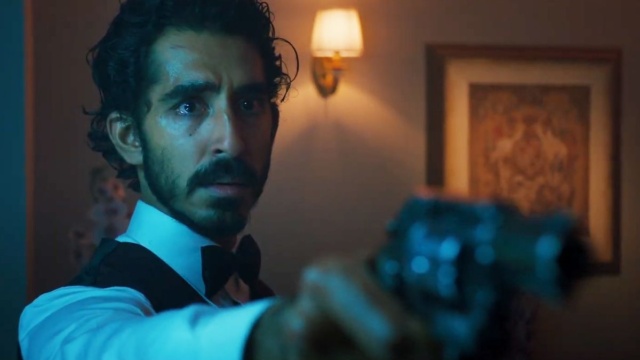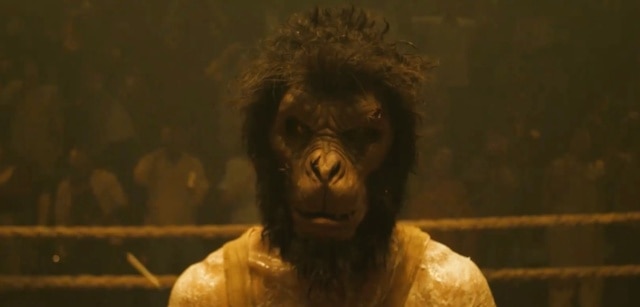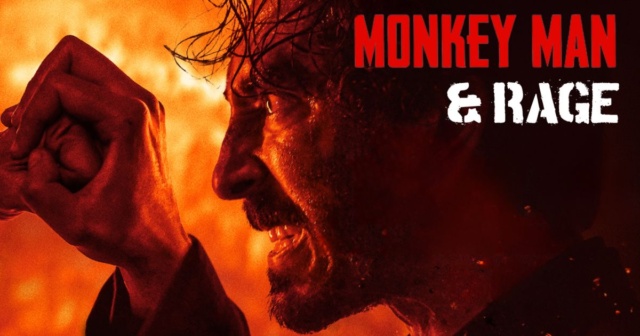‘Monkey Man’ Review: Dev Patel’s Formally Audacious Directorial Debut

Dev Patel’s Monkey Man almost never saw the light of day after suffering a number of production troubles. This included Patel breaking his hand on the first day of shooting and Netflix quietly dropping the film from distribution, citing it too gritty and politically charged for Indian audiences. The fact that it got released (in theaters, no less) this week feels like a major miracle. And we can thank Jordan Peele for this, who, after being immediately blown away by Patel‘s directorial debut, shipped it to Universal for a full-fledged theatrical event.
Numerous changes have been made to its Netflix and theatrical release, but the fact that Monkey Man is here is already a feat to behold. And while most viewers who have never seen a Bollywood film will quickly say it’s like John Wick with Bollywood influences, Patel’s film is so much more than this. And while Monkey Man is directly influenced by anti-corruption Indian films (Rohit Shetty’s Singham immediately comes to mind, which then gets confirmed by a blink-and-you-’ll-miss-it needle drop), it goes above its influences to craft an original, often audacious, actioner, with the best use of digital photography seen since Michael Bay’s Ambulance.
[Warning: mild spoilers discussed below for the film]
Monkey Man: The story
Dev Patel’s film follows a straightforward story in which an unnamed young man, described as “Kid,” but posits himself as Bobby (Patel), targets a group of corrupt leaders. This includes Rana Singh (Sikandar Kher, basically playing the antithesis of Ajay Devgn‘s Bajirao Singham), a dirty police chief who is the sole responsible for his mother’s (Adithi Kalkunte) death.
Kid/Bobby infiltrates an operation run by Queenie (Ashwini Kalsekar) and presents himself as a hardworking employee willing to do what anyone else does not. Quickly moving up the ranks by gaining the trust of Alphonso (Pitobash), Queenie’s second-in-command, Bobby is then taken to the VIP room and begins to distribute cocaine to the corrupt leaders, which include Singh at the table.
When he gets the opportunity to avenge his mother’s death, he takes it. However, the fight goes horribly wrong, leaving Bobby severely wounded. The rest of the film sees our protagonist grapple with the loss of his mother and devise a plan to fire back at Singh, hoping that his corrupt operation ends with him and his associates.

Patel and co-writers Paul Angunawela and John Collee also steep the film with a strong political undertone, often more common in Tamil cinema than in Bollywood, where the root of all corruption begins with policymakers filling their pockets before helping the struggling working man.
The film’s political critique is bold but doesn’t go deep enough
Dev Patel not only criticizes the individuals he paints in his fictional world of Yatana but directly links these people through what is currently happening in India, with archival footage of protests against Narendra Modi’s government, with forces of power brutalizing peaceful protesters to silence. Modi is never named, but the slight archival bits clearly show people rebelling against the Bharatiya Janata Party’s oppression, risking their lives to oppose Modi‘s autocratic government and repressive policies.
It’s also the main reason why the film will likely never see the light of day in India, as it directly goes after Modi’s far-right, extremist administration and the Hindutva ideology as a whole. Most large-scale Indian movies released today don’t dare question the institutions in power and instead act as quasi-mouthpieces for jingoism and love for the motherland.
That’s why a Bollywood picture like Jawan was so bold. It contained a clear anti-corruption message that criticized the institutions in power, but it also had its biggest star, Shah Rukh Khan, slightly break the fourth wall in the most thought-provoking monologue of his career. In it, he urges his audience to think about the future before they cast their vote. He doesn’t name names, but it’s enough to describe how harrowing the political climate in India is. No one else could’ve done this without major repercussions to their career, but since Khan had nothing to lose anymore (the film was released after the lowest box-office grosses of his career and following his son’s arrest), he wasn’t afraid.
Because of this, Patel’s political critique is welcomed in a volatile environment that silences anyone who dares oppose the BJP and Modi’s government. Extremists are also attempting to stop the film from playing at commercial venues, which follows a wave of attacks on South Indian films to prevent them from playing at venues like Cineplex.
Shaking up the system like this is incredibly risky, especially when made within the Hollywood studio system. No wonder Netflix was scared; they have major deals with some of the biggest Indian studios, including SRK’s Red Chillies Entertainment, Maddock Films, and Yash Raj Films. Unfortunately, Patel doesn’t go as deep as he should and only offers surface-level critiques on Modi’s despotic reign.
The archival footage shown is brutal and fits through Patel’s image-making exercise. But as soon as he links his story to real-world events, he seemingly forgets the commentary he wanted to make and never mentions it again. How can you do a politically charged film without engaging with your political messaging, after being as blunt as possible?
That seems like a major cop-out, but it’s also a lingering problem in most political films nowadays. Either the director never fully engages themselves with the politics they present (often adopting a centrist stance on the matter, which is what recently sank a show like Secret Invasion), or will present an important message that deserves to be shown but back off at the last minute, offering no real solutions (Rajkumar Hirani‘s Dunki recently suffered from this problem).
Monkey Man thrives when it’s all visuals
It’s great that Patel has a keen eye for kinetics, which is the heart of Monkey Man’s rousing success, and why the film is as good as it is, thorny politics notwithstanding. The “shaky cam” is never distracting but instead adds to the tension and, most importantly, the imperfection of Kid’s approach in exacting revenge. He doesn’t know how to do it other than climbing the ladder and figuring it out as he goes along.
The pandemic-related shoot brought challenges in capturing action, most notably in using iPhones for key moments, but none of the wild flourishes feel distracting or hamper Kid’s revenge-fueled quest. In fact, they actually enhance the on-screen chaos and offer a more visually exciting, textured palette to the proceedings, perfectly in tune with Kid’s improvisational fighting style.

For the first time in two years (I strongly believe Michael Benjamin Bay‘s Ambulance pushed digital camerawork forward), a digitally shot action blockbuster feels alive, not only in how cinematographer Sharone Meir positions his camera in incredibly weird, almost unnatural angles but also with how they continuously experiment with form through the subjective lens(es) of Kid’s psyche.
There are plenty of visually exhilarating scenes offered by Patel’s approach, with one in particular that sticks out as a spiritually charged journey through Hindu mythology and religion, acting as an internal shift to his transformation, with a distorted, almost pixelated image representing an ever-growing heart inside of his very being.
It’s the most potent image released in any major blockbuster this year so far and immediately cements Dev Patel as a major image-maker, even if his narrative beats are muddled and often frustrating. His dialogue skills aren’t as refined as his images, which is likely why most of the film is told with few spoken words. This helps him craft killer action, which gets gnarly (very) fast and elevates the film’s deliberately slow pace to staggeringly tense highs (side note: the Quebec Ministry of Culture gave the film a 16+ rating, a rare instance in our soft ratings board).
Patel also has fun with comedy, frequently subverting expectations through his actions with an astute sense of playfulness, à la John Wick. It’s the only time where the two films can be compared because what comes before (and after) can’t be more different in its thematic underpinnings and formal exercise.
As Kid, Patel himself is excellent and carries most of the film’s emotional through line. He never plays Kid with a “straight” face and instead consistently evolves his character by the physical (and moral) challenges he has to overcome. It’s often playful, but also more serious than initially presented. When he stops giving a damn anymore, that’s when it gets slightly funny, but he has to go through an array of internal shifts before he’s fully in tune with carrying out the vengeance he’s been craving since his mother died in front of him.
It may not be Patel’s greatest performance, but it’s his most artistically interesting. He continuously examines his character based on his own subjectivity as an actor and through the multiple lenses (and camera positions) he shoots them with.
An exciting beginning for Dev Patel as a director
Rarely have we seen such visual (and acting) mastery from a first-time director, but Patel is a true force to be reckoned with. He’ll obviously improve his messaging and non-visual storytelling in future projects, but he’s already on the right path to becoming one of the greatest actor-turned-directors of our time.
I may be jumping the gun, but I’ve never been this excited at the prospect of an actor-turned-director since Jordan Peele blew us all away with Get Out in 2017. And whaddya know, Peele is acting like a mentor figure for Patel, saving Monkey Man from the Netflix industrial complex and putting it out in cinemas, where it belongs to be seen. With that, Dev Patel’s future as a filmmaker is in (very) safe hands.
Monkey Man is now playing in cinemas. Do you plan on watching it? Let us know on social media @mycosmiccircus or in The Cosmic Circus Discord!



